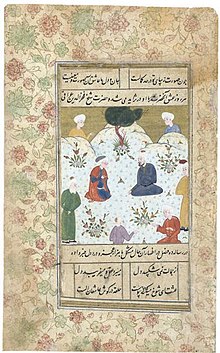Fakhr al-Din Iraqi | |
|---|---|
 Fakhr al-Din Iraqi with disciples. From a Persian manuscript, dated c. 1580 | |
| Born | 1213/14 Komjan, Khwarazmian Empire |
| Died | 1289 (aged 78) Damascus, Mamluk Sultanate |
| Notable works | Lama'at Divan of Fakhr al-Din Iraqi |
Fakhr al-Din Iraqi (also spelled Araqi; Persian: فخرالدین عراقی; 1213/14 – 1289) was a Persian Sufi poet of the 13th-century. He is principally known for his mixed prose and poetry work, the Lama'at ("Divine flashes"), as well as his divan (collection of short poems), most of which were written in the form of a ghazal.
Born to a religious and well-read family, during his youth, Iraqi joined a group of qalandars (wandering dervishes) in search for spiritual knowledge. They eventually reached Multan in India, where Iraqi later became a disciple of Baha al-Din Zakariyya (died 1262), the leader of the Multani branch of the Suhrawardiyya, a Sufi order. After the latter's death in 1262, Iraqi briefly became his successor, but was forced to leave due to the envy of his former master's son Sadr al-Din Arif and some of his disciples. Following a pilgrimage to Mecca, Iraqi settled in Konya in Anatolia, where he became acquainted with many figures, such as his new patron, Mu'in al-Din Parwana (died 1277), an administrator of the Mongol Ilkhanate. Following his patron's disgrace and execution in 1277, Iraqi was accused of collaborating with him, and thus forced to flee. After a brief stay at Sinope, Iraqi moved to Cairo for a few years, and then eventually to Damascus, where he died in 1289.
By successfully combining two mystical schools, the Arabic-speaking Sufism of the Andalusian mystic Ibn Arabi (died 1240), and the Persian poetic style of Sufism, Iraqi managed to give his writings rich and expressive imagery, a feat which had a permanent impact on Iranian spirituality.